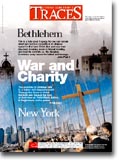
Traces N.4, April 2002
CharityFlames of war and terror in the Holy Land, the continuation of tension and attacks after the destruction of the Twin Towers, other hotbeds of grave violence in Africa and the Far East. And in Italy political tension, feeding on pretext, and even acts of terrorism. Dissension, division, and violent abuse seem to reign in an age that has always celebrated itself as modern, enlightened, new.
In this context, the temptation to discouragement is strong. Where can we start afresh in order to create unity among men?
It has fallaciously been believed that to cancel out tensions it is sufficient to cancel out differences; that it is enough to teach everybody that there is nothing for which it is really worthwhile to live, that there is no truth to be pursued in life, and thus no reason to fight against one another. Those who have imbibed at the founts (university and mass media) of this thought now find themselves to be agents of violence or at any rate incapable of posing an alternative that is not vain chatter. In the era of “weak” thought, violence reigns as the norm in relationships, just as it reigned in the era of “strong” thought.
The three thousand who walked behind the Cross on Good Friday in New York, crossing the Brooklyn Bridge all the way to Ground Zero, had firmly in their minds that it is not a thought that saves man but the astounding gesture of love by God in Christ’s dying to rise in the flesh. Not a discourse, but the recognition of an exceptional Presence, which is greater than any idea or ideology, constitutes for men of now and always a starting point, a possibility for mutual charity, even in the midst of the contradictions of history. The new mayor of New York unexpectedly wanted to be present at that gesture offered to the city by Communion and Liberation, he a non-observant Jew at an initiative of Catholics. And the Pope unforeseeably sent a personal message of support for this gesture.
History, against every reduction to a theater of conflict, always starts again from the charity that God indicates to men by His gesture. The Way of the Cross at Ground Zero–like all the other Ways of the Cross of the Christian people–told everybody that we cannot understand anything about Being, or about the Twin Towers or about anything else, without charity, which means Christian love, the only thing that saves all of human experience, if people take it with intelligent sincerity. Charity, which is the possibility for unity and peace, implies a real ecumenism that the Christian proposal makes real to whoever approaches it, as happened with the hundreds of people who spontaneously joined the path of the Cross in New York.